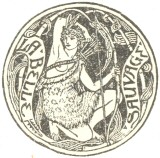Transcribed from the 1893 Cassell & Company edition byDavid Price,
Transcriber’s note:Changed “considering that the most barbarous, rude, and unlearnedtimes have been most subject to tumults, seditious, and changes” to“considering that the most barbarous, rude, and unlearned times havebeen most subject to tumults, seditions, and changes”.
CASSELL’S NATIONAL LIBRARY.
THE
Advancement
OF
Learning.
BY
FRANCIS BACON.
CASSELL & COMPANY, Limited:
LONDON, PARIS &MELBOURNE.
1893.
INTRODUCTION.
“The Tvvoo Bookes of FrancisBacon. Of the proficience and aduancement of Learning,divine and humane. To the King. At London.Printed for Henrie Tomes, and are to be sould at his shop atGraies Inne Gate in Holborne. 1605.” That wasthe original title-page of the book now in the reader’shand—a living book that led the way to a new world ofthought. It was the book in which Bacon, early in the reignof James the First, prepared the way for a full setting forth ofhis New Organon, or instrument of knowledge.
The Organon of Aristotle was a set of treatises in whichAristotle had written the doctrine of propositions. Studyof these treatises was a chief occupation of young men when theypassed from school to college, and proceeded from Grammar toLogic, the second of the Seven Sciences. Francis Bacon as ayouth of sixteen, at Trinity College, Cambridge, felt theunfruitfulness of this method of search after truth. He wasthe son of Sir Nicholas Bacon, Queen Elizabeth’s LordKeeper, and was born at York House, in the Strand, on the 22nd ofJanuary, 1561. His mother was the Lord Keeper’ssecond wife, one of two sisters, of whom the other married SirWilliam Cecil, afterwards Lord Burleigh. Sir Nicholas Baconhad six children by his former marriage, and by his second wifetwo sons, Antony and Francis, of whom Antony was about two yearsthe elder. The family home was at York Place, and atGorhambury, near St. Albans, from which town, in its ancient andits modern style, Bacon afterwards took his titles of Verulam andSt. Albans.
Antony and Francis Bacon went together to Trinity College,Cambridge, when Antony was fourteen years old and Francistwelve. Francis remained at Cambridge only until hissixteenth year; and Dr. Rawley, his chaplain in after-years,reports of him that “whilst he was commorant in theUniversity, about sixteen years of age (as his lordship hath beenpleased to impart unto myself), he first fell into dislike of thephilosophy of Aristotle; not for the worthlessness of the author,to whom he would ascribe all high attributes, but for theunfruitfulness of the way, being a philosophy (as his lordshipused to say) only strong for disputatious and contentions, butbarren of the production of works for the benefit of the life ofman; in which mind he continued to his dying day.”Bacon was sent as a youth of sixteen to Paris with the ambassadorSir Amyas Paulet, to begin his training for the public service;but his father’s
